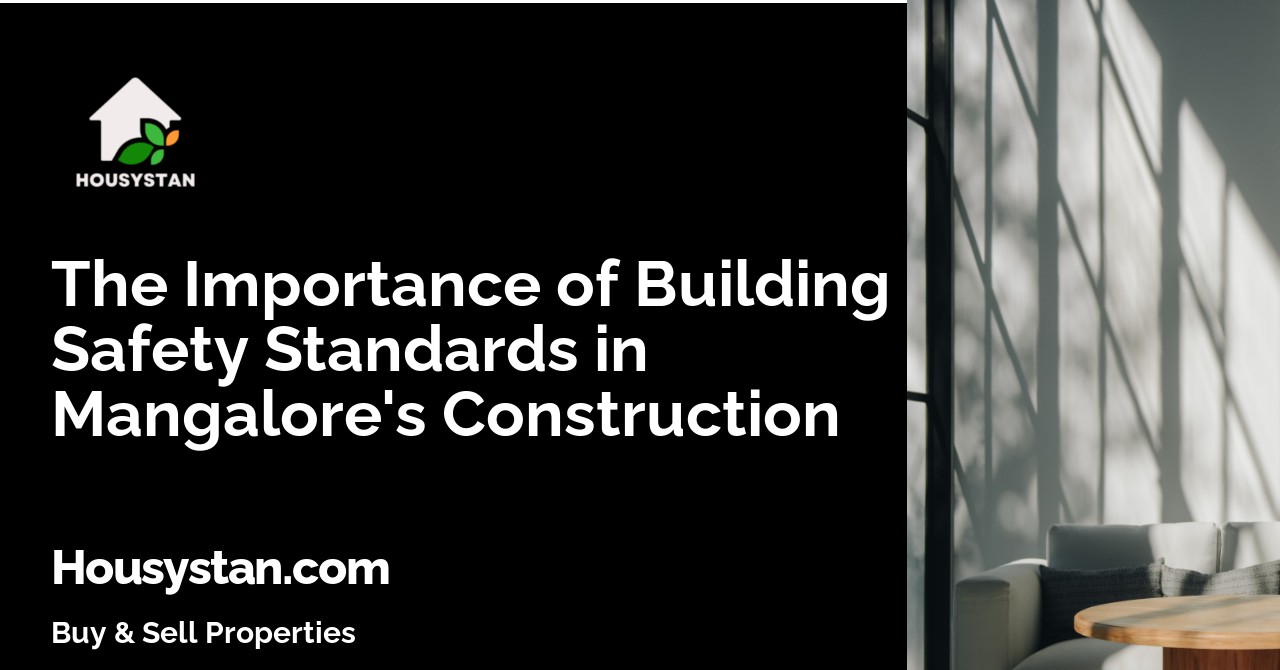The Importance of Building Safety Standards in Mangalore's Construction
Read latest blogs and articles from Housystan

The Information mentioned here was last updated on:
29/1/2026The Importance of Building Safety Standards in Mangalore's Construction
Mangalore, a city known for its picturesque beaches and vibrant cultural heritage, is also experiencing rapid urban growth. New construction projects are springing up continually, fueling economic development. However, this growth also highlights the critical need for robust building safety standards. Ensuring safe construction practices is not just about compliance; it's about safeguarding lives and properties.
Why Building Safety Standards Matter in Mangalore
- Verified Tenants/Buyers
- Unlimited Property Listing
- Zero subscription/charges fee
Building safety standards are essential for ensuring that structures are resilient, safe, and sustainable. In Mangalore, where environmental challenges such as heavy monsoon rains and high winds are prevalent, adhering to stringent safety regulations is even more crucial. The following points underscore the importance of these standards in Mangalore's construction industry:
- Protection from Natural Disasters: Mangalore's geographic location makes it susceptible to natural calamities like cyclones and heavy rainfall. Compliant construction standards help mitigate damage from these events.
- Enhancing Structural Integrity: Safety standards ensure that buildings are constructed with the right materials and techniques to withstand environmental pressures, reducing the risk of collapse.
- Public Safety and Well-being: Safe structures minimize the risk of accidents and injuries, ensuring that residents and workers remain safe during both construction and post-construction phases.
- Economic Efficiency: Investing in safety can reduce the need for costly repairs and potential rebuilding after disasters, making it economically advantageous in the long run.
Key Components of Building Safety Standards
Effective building safety standards encompass several critical aspects that contribute to comprehensive safety and structural integrity. Here's a look at some of the primary components:
1. Structural Design Criteria
This involves engineering principles that ensure buildings can withstand physical forces. In Mangalore, structures need to be designed to resist strong winds and heavy rain. Key elements include:
- Load-bearing calculations to ensure foundations and frames can support the intended weight and usage.
- Wind resistance measures to prevent structural damage during storms.
2. Quality of Construction Materials
Using high-quality, certified materials is non-negotiable. This includes:
- Cement, steel, and other building materials that meet regulated specifications for strength and durability.
- Appropriate waterproofing materials to prevent water ingress during monsoons.
3. Fire Safety Regulations
Fire safety is essential to safeguard lives and property. Standards incorporate:
- Fire-resistant materials and construction techniques.
- Ensuring exits, smoke detectors, and sprinklers are part of the building's design.
4. Compliance and Inspections
Regular inspections ensure compliance with building codes. This involves:
- Routine checks during different construction phases.
- Final inspections before habitation to certify safety compliance.
5. Environmental Sustainability
Sustainable practices in construction go hand in hand with safety standards:
- Implementing rainwater harvesting that aligns with safety standards.
- Integrating energy-efficient systems for better ecological balance.
Challenges Faced in Implementing Safety Standards
Despite the clear benefits, several challenges can impede the effective implementation of safety standards in Mangalore's construction industry:
- Lack of Awareness: Builders and workers may not always be fully aware of specific safety regulations, leading to unintentional non-compliance.
- Cost Constraints: Initial investment for adhering to safety standards can seem high, deterring some builders from full compliance.
- Regulatory Enforcement: Inconsistent enforcement of safety regulations by local authorities can lead to lapses in compliance.
- Skilled Workforce Shortage: The lack of adequately trained personnel can undermine the implementation of safety measures.
How to Overcome These Challenges
Addressing these challenges requires a concerted effort from multiple stakeholders in the construction industry:
1. Enhanced Training Programs
- Providing regular training for workers and contractors about safety protocols and standards.
- Workshops and seminars conducted by industry experts to keep all stakeholders updated.
2. Incentives for Compliance
- Offering tax breaks or financial incentives to those who comply with safety standards.
- Recognizing and awarding projects that prioritize safety compliance.
3. Strengthening Regulatory Framework
- Ensuring that local authorities have the resources to enforce building codes effectively.
- Implementing stringent penalties for non-compliance to deter violations.
4. Public Awareness Campaigns
- Running campaigns to educate the public about the importance of safety standards.
- Encouraging community involvement and vigilance in construction practices.
The Role of Technology in Enhancing Safety
The integration of technology in construction can significantly enhance safety measures:
- Drones: Used for site inspections, drones provide a comprehensive view of construction progress, ensuring compliance at every stage.
- Building Information Modeling (BIM): BIM software helps in designing buildings that meet all safety standards by simulating environmental impacts.
- Smart Sensors: Installed throughout construction sites, smart sensors can quickly detect safety risks like structural weaknesses or gas leaks.
Incorporating these technologies not only improves adherence to safety standards but also enhances overall construction efficiency.
Conclusion
The importance of building safety standards in Mangalore's construction cannot be overstated. As the city continues to grow, prioritizing safety in construction projects is essential for protecting lives, investments, and the environment. By overcoming challenges through education, technological integration, and regulatory reinforcement, Mangalore can set a benchmark in safe and sustainable urban development.